France's new president is enticingly young — and incredibly boring
Emmanuel Macron is the most snooze-worthy thing to happen to France in a long time
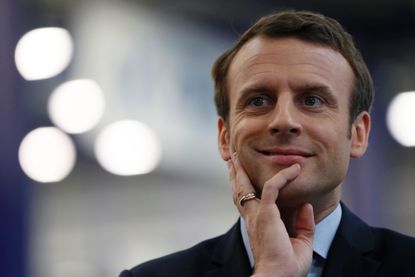

On paper, Emmanuel Macron looks very exciting. He is the youngest president in the history of the French Republic. A virtual unknown until recently, he founded his own political party just a year ago. He wants to move France beyond its old left-right partisan divide (although, I argue, he hasn't). The global establishmentarian press breathed a sigh of relief when he defeated the National Front's Marine Le Pen, stopping a global wave of populism. He has the English tabloid press clutching its pearls at the fact that he is married to his former high school drama teacher.
Despite all these tantalizing details, Macron is the most boring thing to have happened in French politics in a very long time. Scrape off the post-partisan veneer, and he is a conventional center-left politician, like the previous two Socialists to win a national election in France, François Hollande, his political mentor, and Lionel Jospin. Like them, he is a graduate of ENA, the elite French school for civil service that feeds France's ruling class. And like many ENA grads, Macron has been through the revolving door between bureaucracy and banking.
His campaign was vintage late-2000s, entirely media-driven, like Nicolas Sarkozy's in his day. Meanwhile, Macron's far-left rival, Jean-Luc Mélenchon, ran an online-driven campaign, and its agenda was collaboratively edited, mulled over, and voted on by 400,000 members of his online platform, which is at least somewhat innovative and interesting.
Subscribe to The Week
Escape your echo chamber. Get the facts behind the news, plus analysis from multiple perspectives.

Sign up for The Week's Free Newsletters
From our morning news briefing to a weekly Good News Newsletter, get the best of The Week delivered directly to your inbox.
From our morning news briefing to a weekly Good News Newsletter, get the best of The Week delivered directly to your inbox.
But what is most striking about Macron is his total lack of a single original idea, especially considering the man has a degree in philosophy and was editorial assistant to a good French philosopher, Paul Ricoeur, in graduate school. After his election, his alma mater, Sciences Po, another breeding ground of the French political elite, published an article of recollections by fellow students and teachers. Aside from his brilliance, Macron's peers seemed mostly to remember his proclivity for synthesizing other's thoughts and for ingratiating himself. A recent Obama biography revealed that some of the former president's law school peers had invented an "Obamanometer" to rank "how pretentious someone's remarks are in class." I wonder if there was a Macronometer at ENA. Perhaps it measured how quickly a conversation puts others to sleep?
Macron's brand of trans-partisan centrism can be instantly recognized as a kind of vague Davos Man pro-business technocratism. Whatever you think of this on the merits, it's perhaps the most boring ideology in the world, and is about as old as Macron himself. And Macron's agenda reflects this: a little deregulation, but not too much; cut a little government spending here, spend a little more there. Macron's biggest idea when it comes to education? Smaller class sizes! Groundbreaking.
While Macron claims to want to appoint new faces to government, and probably will to some extent, his key advisers and the men he has picked to shape his policies have been in the halls of power for decades. His chief economic adviser, Jean Pisani-Ferry, has been economic adviser to pretty much every center-left government for 20 years. Jacques Attali, another Macron mentor, is an interesting figure as an intellectual, but his policy ideas are as boring as watching paint dry. Another key backer is Alain Minc, a bureaucrat-turned-investment-banker, whose chief contribution to the life of ideas was inventing the phrase "the circle of reason" to describe people with "responsible" views (aka views that reflect his own).
Macron's blandness is all the more impressive considering that world politics these days are actually really interesting. The euro and the European Union are in disarray. As Michael Brendan Dougherty noted, Brexit represents an opportunity for the U.K. to essentially rewrite a lot of its rulebook. The tensions wrought by globalization and technological change call desperately for fresh thinking and seem to make the impossible possible. And yet, despite all this new energy and new possibility, Macron's interviews and speeches could come straight from the early 1990s.
Elections can be overheated affairs. Macron is an intelligent and responsible man with intelligent and responsible ideas, and France could do a lot worse as president. I do not hate him. I only slightly dislike him. But I can't help it: He hasn't even been sworn in yet, and he already utterly bores me.
Sign up for Today's Best Articles in your inbox
A free daily email with the biggest news stories of the day – and the best features from TheWeek.com
Pascal-Emmanuel Gobry is a writer and fellow at the Ethics and Public Policy Center. His writing has appeared at Forbes, The Atlantic, First Things, Commentary Magazine, The Daily Beast, The Federalist, Quartz, and other places. He lives in Paris with his beloved wife and daughter.
-
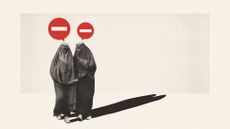 Has the Taliban banned women from speaking?
Has the Taliban banned women from speaking?Today's Big Question 'Rambling' message about 'bizarre' restriction joins series of recent decrees that amount to silencing of Afghanistan's women
By Harriet Marsden, The Week UK Published
-
 Cuba's energy crisis
Cuba's energy crisisThe Explainer Already beset by a host of issues, the island nation is struggling with nationwide blackouts
By Rebekah Evans, The Week UK Published
-
 Putin's fixation with shamans
Putin's fixation with shamansUnder the Radar Secretive Russian leader, said to be fascinated with occult and pagan rituals, allegedly asked for blessing over nuclear weapons
By Harriet Marsden, The Week UK Published
-
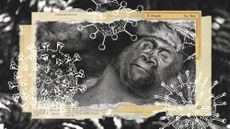 Chimpanzees are dying of human diseases
Chimpanzees are dying of human diseasesUnder the radar Great apes are vulnerable to human pathogens thanks to genetic similarity, increased contact and no immunity
By Harriet Marsden, The Week UK Published
-
 Deaths of Jesse Baird and Luke Davies hang over Sydney's Mardi Gras
Deaths of Jesse Baird and Luke Davies hang over Sydney's Mardi GrasThe Explainer Police officer, the former partner of TV presenter victim, charged with two counts of murder after turning himself in
By Austin Chen, The Week UK Published
-
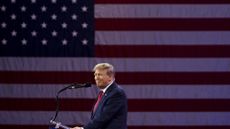 Quiz of The Week: 24 February - 1 March
Quiz of The Week: 24 February - 1 MarchPuzzles and Quizzes Have you been paying attention to The Week's news?
By Sorcha Bradley, The Week UK Published
-
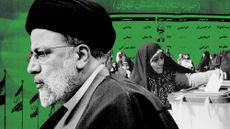 Will mounting discontent affect Iran election?
Will mounting discontent affect Iran election?Today's Big Question Low turnout is expected in poll seen as crucial test for Tehran's leadership
By Sorcha Bradley, The Week UK Published
-
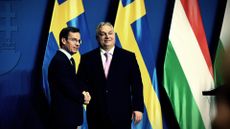 Sweden clears final NATO hurdle with Hungary vote
Sweden clears final NATO hurdle with Hungary voteSpeed Read Hungary's parliament overwhelmingly approved Sweden's accession to NATO
By Peter Weber, The Week US Published


